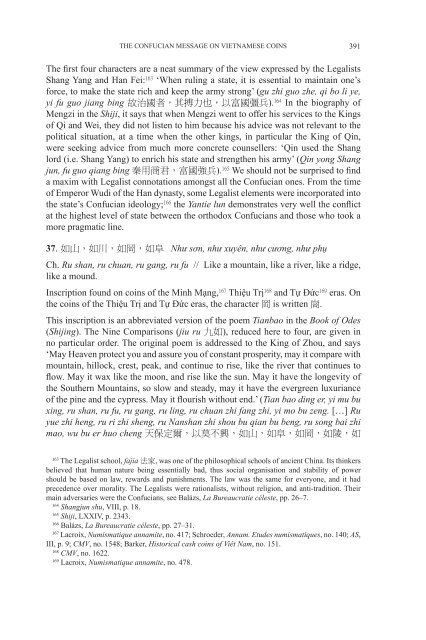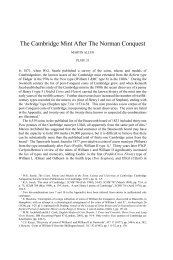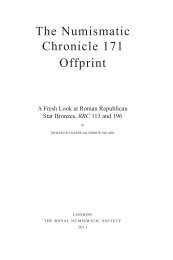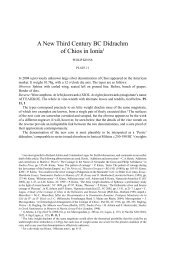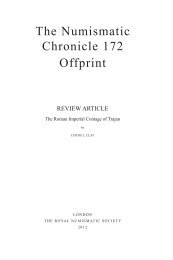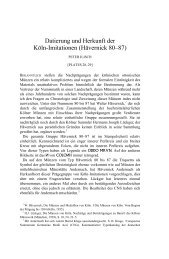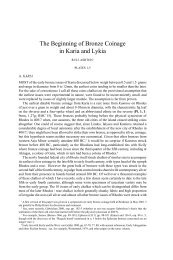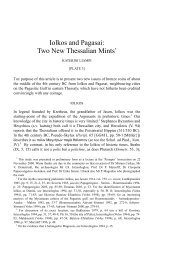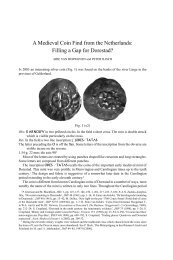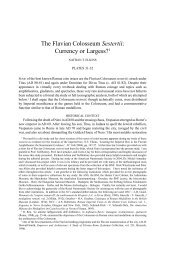The Numismatic Chronicle 171 Offprint - Royal Numismatic Society
The Numismatic Chronicle 171 Offprint - Royal Numismatic Society
The Numismatic Chronicle 171 Offprint - Royal Numismatic Society
You also want an ePaper? Increase the reach of your titles
YUMPU automatically turns print PDFs into web optimized ePapers that Google loves.
THE CONFUCIAN MESSAGE ON VIETNAMESE COINS 391<br />
<strong>The</strong> fi rst four characters are a neat summary of the view expressed by the Legalists<br />
Shang Yang and Han Fei: 163 ‘When ruling a state, it is essential to maintain one’s<br />
force, to make the state rich and keep the army strong’ (gu zhi guo zhe, qi bo li ye,<br />
yi fu guo jiang bing 故治國者,其搏力也,以富國彊兵). 164 In the biography of<br />
Mengzi in the Shiji, it says that when Mengzi went to offer his services to the Kings<br />
of Qi and Wei, they did not listen to him because his advice was not relevant to the<br />
political situation, at a time when the other kings, in particular the King of Qin,<br />
were seeking advice from much more concrete counsellers: ‘Qin used the Shang<br />
lord (i.e. Shang Yang) to enrich his state and strengthen his army’ (Qin yong Shang<br />
jun, fu guo qiang bing 秦用商君,富國強兵). 165 We should not be surprised to fi nd<br />
a maxim with Legalist connotations amongst all the Confucian ones. From the time<br />
of Emperor Wudi of the Han dynasty, some Legalist elements were incorporated into<br />
the state’s Confucian ideology; 166 the Yantie lun demonstrates very well the confl ict<br />
at the highest level of state between the orthodox Confucians and those who took a<br />
more pragmatic line.<br />
37. 如山,如川,如岡,如阜 Như sơn, như xuyên, như cương, như phụ<br />
Ch. Ru shan, ru chuan, ru gang, ru fu // Like a mountain, like a river, like a ridge,<br />
like a mound.<br />
Inscription found on coins of the Minh Mạng, 167 Thiệu Trị168 and Tự Đức169 eras. On<br />
the coins of the Thiệu Trị and Tự Đức eras, the character 岡 is written 崗.<br />
This inscription is an abbreviated version of the poem Tianbao in the Book of Odes<br />
(Shijing). <strong>The</strong> Nine Comparisons (jiu ru 九如), reduced here to four, are given in<br />
no particular order. <strong>The</strong> original poem is addressed to the King of Zhou, and says<br />
‘May Heaven protect you and assure you of constant prosperity, may it compare with<br />
mountain, hillock, crest, peak, and continue to rise, like the river that continues to<br />
fl ow. May it wax like the moon, and rise like the sun. May it have the longevity of<br />
the Southern Mountains, so slow and steady, may it have the evergreen luxuriance<br />
of the pine and the cypress. May it fl ourish without end.’ (Tian bao ding er, yi mu bu<br />
xing, ru shan, ru fu, ru gang, ru ling, ru chuan zhi fang zhi, yi mo bu zeng. […] Ru<br />
yue zhi heng, ru ri zhi sheng, ru Nanshan zhi shou bu qian bu beng, ru song bai zhi<br />
mao, wu bu er huo cheng 天保定爾,以莫不興,如山,如阜,如岡,如陵,如<br />
163 <strong>The</strong> Legalist school, fajia 法家, was one of the philosophical schools of ancient China. Its thinkers<br />
believed that human nature being essentially bad, thus social organisation and stability of power<br />
should be based on law, rewards and punishments. <strong>The</strong> law was the same for everyone, and it had<br />
precedence over morality. <strong>The</strong> Legalists were rationalists, without religion, and anti-tradition. <strong>The</strong>ir<br />
main adversaries were the Confucians, see Balázs, La Bureaucratie céleste, pp. 26–7.<br />
164 Shangjun shu, VIII, p. 18.<br />
165 Shiji, LXXIV, p. 2343.<br />
166 Balázs, La Bureaucratie céleste, pp. 27–31.<br />
167 Lacroix, Numismatique annamite, no. 417; Schroeder, Annam. Etudes numismatiques, no. 140; AS,<br />
III, p. 9; CMV, no. 1548; Barker, Historical cash coins of Viêt Nam, no. 151.<br />
168 CMV, no. 1622.<br />
169 Lacroix, Numismatique annamite, no. 478.


